|
|
|
Sort Order |
|
|
|
Items / Page
|
|
|
|
|
|
|
| Srl | Item |
| 1 |
ID:
138088
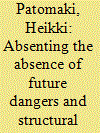

|
|
|
|
|
| Summary/Abstract |
One of the great appeals of securitization theory, and a major reason for its success, has been its usefulness as a tool for empirical research: an analytic framework capable of practical application. However, the development of securitization has raised several criticisms, the most important of which concern the nature of securitization theory. In fact, the appropriate methods, the research puzzles and type of evidence accepted all derive to a great extent from the kind of theory scholars bequeath their faith to. This Forum addresses the following questions: What type of theory (if any) is securitization? How many kinds of theories of securitization do we have? How can the differences between theories of securitization be drawn? What is the status of exceptionalism within securitization theories, and what difference does it make to their understandings of the relationship between security and politics? Finally, if securitization commands that leaders act now before it is too late, what status has temporality therein? Is temporality enabling securitization to absorb risk analysis or does it expose its inherent theoretical limits?
|
|
|
|
|
|
|
|
|
|
|
|
|
|
|
|
| 2 |
ID:
149483


|
|
|
|
|
| Summary/Abstract |
This article assesses the role of the audience in securitization theory. The main argument is that in order to accurately capture the role of the securitization audience, it must be theorized as an active agent, capable of having a meaningful effect on the intersubjective construction of security values. Through a meta-synthesis of 32 empirical studies of securitization, this article focuses on two central questions: (1) Who is the audience? (2) How does the audience engage in the construction of security? When assessed against the theoretical works on securitization, this analysis reveals that the manner in which the audience is defined and characterized within securitization theory differs with the empirical literature that investigates securitization processes. Where the empirical literature suggests securitization is a highly intersubjective process involving active audiences, securitization theory characterizes audiences as agents without agency, thereby marginalizing the theory’s intersubjective nature. This article sketches a new characterization of the securitization audience and outlines a framework for securitizing actor–audience interaction that better accounts for securitization theory’s linguistic and intersubjective character, addresses this theoretical/empirical conflict, and improves our understanding of how groups select and justify security priorities and costly security policies.
|
|
|
|
|
|
|
|
|
|
|
|
|
|
|
|
| 3 |
ID:
138085
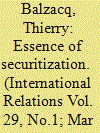

|
|
|
|
|
| Summary/Abstract |
One of the great appeals of securitization theory, and a major reason for its success, has been its usefulness as a tool for empirical research: an analytic framework capable of practical application. However, the development of securitization has raised several criticisms, the most important of which concern the nature of securitization theory. In fact, the appropriate methods, the research puzzles and type of evidence accepted all derive to a great extent from the kind of theory scholars bequeath their faith to. This Forum addresses the following questions: What type of theory (if any) is securitization? How many kinds of theories of securitization do we have? How can the differences between theories of securitization be drawn? What is the status of exceptionalism within securitization theories, and what difference does it make to their understandings of the relationship between security and politics? Finally, if securitization commands that leaders act now before it is too late, what status has temporality therein? Is temporality enabling securitization to absorb risk analysis or does it expose its inherent theoretical limits?
|
|
|
|
|
|
|
|
|
|
|
|
|
|
|
|
| 4 |
ID:
123923


|
|
|
|
|
| Publication |
2013.
|
| Summary/Abstract |
Turkish television drama series were locally produced products until the early 2000s. Since then, about 70 different titles have been broadcast to audiences in 40 countries, especially in the Middle East, where they comprise approximately 60% of the share in foreign programme broadcasts. This article explores the factors that led to such an attraction by considering the debates around the impact of transnational media products on Arab cultural identity. The authors conducted focus groups and interviews with audiences in Palestine and Egypt and with the producers/distributors of these TV series in Turkey. The data presented here comprise the results of one of the first field-based studies on the reception of Turkish media products in the region. Foremost, the Arab audience response to these Turkish TV series highlights the differences in conceptualisations of 'modernity' in the Arab World. Moreover, the data suggest that audiences do not necessarily consider transnational media products as culprits that corrupt cultural identity.
|
|
|
|
|
|
|
|
|
|
|
|
|
|
|
|
| 5 |
ID:
148329


|
|
|
|
|
| Summary/Abstract |
Full securitization has largely been regarded as something negative that should be avoided. While acknowledging this, the present article adds that securitization moves that fail to succeed (i.e. that end in securitization failure) can, at least in the environmental sector of security, trigger positive outcomes if a given issue becomes (re)politicized rather than depoliticized. This is because securitization moves can be helpful in raising sufficient awareness of an issue to gain the attention of the relevant audience(s). Subsequently, the article argues, different audience strategies determine whether securitization moves are turned into securitization failure as (re)politicization or securitization failure as depoliticization. The article introduces different behavioral strategies that audiences can employ to reject securitization moves: the passive recipient strategy, the blocking strategy, and the active reshaping strategy. Only the latter indicates that an audience not interested in letting securitization moves succeed simultaneously seeks to have the issue in question be, or remain, a part of the political agenda. The article uses the spring 2010 Mekong crisis as a test case to support its theoretical arguments.
|
|
|
|
|
|
|
|
|
|
|
|
|
|
|
|
| 6 |
ID:
152407


|
|
|
|
|
| Summary/Abstract |
A recent wave of scholarship has drawn attention to the need for further engagement with the role of ‘the audience’ in securitization ‘games’. This article contributes to this discussion both theoretically and empirically by exploring the types of question an audience may ask of a securitizing actor before a securitizing act meets with success or failure. To do this, it offers a discursive analysis of all 27 UK parliamentary debates on the extension of proscription powers to additional terrorist organizations between 2002 and 2014. We argue first that these debates are characterized by a wide range of questions relating to the timing, criteria, mechanics, consequences and exclusions of proscription; and second, that these questions function as demands upon the executive to variously justify, explain, clarify, elaborate and defend decisions to extend the UK’s list of designated groups. Taking these questions seriously, we suggest, therefore allows insight into a variety of ways in which audiences might participate in security politics that are not adequately captured by notions of consent or resistance, or success or failure. This has empirical and theoretical value for understanding proscription, parliamentary discourse and securitization alike.
|
|
|
|
|
|
|
|
|
|
|
|
|
|
|
|
| 7 |
ID:
123875
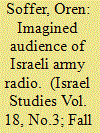

|
|
|
|
|
| Publication |
2013.
|
| Summary/Abstract |
Since 1950, the Israel Defense Forces has operated the Galei Tzahal radio station, which broadcasts to the general public. Over the years, substantial changes have taken place in the station's programming, as it grew from a marginal broadcasting body into a major radio station with high ratings. This study examines a particular aspect of the station's history-its imagined audience-and the fundamental changes in the perception of that audience over time.
|
|
|
|
|
|
|
|
|
|
|
|
|
|
|
|
| 8 |
ID:
138084
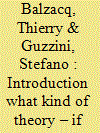

|
|
|
|
|
| Summary/Abstract |
One of the great appeals of securitization theory, and a major reason for its success, has been its usefulness as a tool for empirical research: an analytic framework capable of practical application. However, the development of securitization has raised several criticisms, the most important of which concern the nature of securitization theory. In fact, the appropriate methods, the research puzzles and type of evidence accepted all derive to a great extent from the kind of theory scholars bequeath their faith to. This Forum addresses the following questions: What type of theory (if any) is securitization? How many kinds of theories of securitization do we have? How can the differences between theories of securitization be drawn? What is the status of exceptionalism within securitization theories, and what difference does it make to their understandings of the relationship between security and politics? Finally, if securitization commands that leaders act now before it is too late, what status has temporality therein? Is temporality enabling securitization to absorb risk analysis or does it expose its inherent theoretical limits?
|
|
|
|
|
|
|
|
|
|
|
|
|
|
|
|
| 9 |
ID:
149202
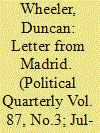

|
|
|
|
|
| Summary/Abstract |
Spain finds itself at an impasse: currently without government, no immediate solution is in sight. Mariano Rajoy and his right-of-centre Partido Popular/Popular Party (PP) received more votes than any other political formation at the general elections held on 20 December 2015, but were significantly short of an absolute majority; even if their MPs had been pooled with those of Ciudadanos—the most market-driven of the recent political start-ups—this would be insufficient to form a government, and none of the other major political parties were willing to play ball with a leader who has behaved in a self-interested, corrupt and authoritarian manner since his election in 2011. The Partido Socialista Obrero Español/Spanish Socialist Workers' Party (PSOE), under the leadership of the physically attractive but seemingly insubstantial Pedro Sánchez then had the opportunity to form their own coalition, but negotiations were far from straightforward.
|
|
|
|
|
|
|
|
|
|
|
|
|
|
|
|
| 10 |
ID:
138086
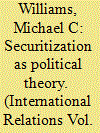

|
|
|
|
|
| Summary/Abstract |
One of the great appeals of securitization theory, and a major reason for its success, has been its usefulness as a tool for empirical research: an analytic framework capable of practical application. However, the development of securitization has raised several criticisms, the most important of which concern the nature of securitization theory. In fact, the appropriate methods, the research puzzles and type of evidence accepted all derive to a great extent from the kind of theory scholars bequeath their faith to. This Forum addresses the following questions: What type of theory (if any) is securitization? How many kinds of theories of securitization do we have? How can the differences between theories of securitization be drawn? What is the status of exceptionalism within securitization theories, and what difference does it make to their understandings of the relationship between security and politics? Finally, if securitization commands that leaders act now before it is too late, what status has temporality therein? Is temporality enabling securitization to absorb risk analysis or does it expose its inherent theoretical limits?
|
|
|
|
|
|
|
|
|
|
|
|
|
|
|
|
| 11 |
ID:
172289
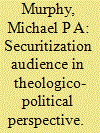

|
|
|
|
|
| Summary/Abstract |
Over the past two decades, securitization theory has developed into a robust literature of cases and critiques. The vast majority of the attention paid to securitization has been to the securitizing actor and the referent object, leaving the audience – the body that determines the fate of a securitizing move by accepting or rejecting the securitizing actor’s request – undertheorized. The audience is presented as a problematic contradiction, because as a collectivity called by the securitizing actor it appears to be a passive body, critiqued thereby as potentially irrelevant. On the other hand, both the original Copenhagen school formulation of securitization theory and many of its current theorists reaffirm the agency of the audience to actively determine the success or failure of the securitizing move. This article turns to political theology for guidance, and explains the contradiction of the passive/active audience through homology to the ekklesia and the acclamation of ‘amen’ in liturgical doxology. The fact that the congregation is passive recipient of a call does not negate the essential and substantial role that it must actively play, just as the contradiction of the passive/active description of the securitization audience is not a problem of illogic, but a paraconsistent truth.
|
|
|
|
|
|
|
|
|
|
|
|
|
|
|
|
| 12 |
ID:
097230


|
|
|
| 13 |
ID:
138087
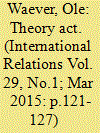

|
|
|
|
|
| Summary/Abstract |
One of the great appeals of securitization theory, and a major reason for its success, has been its usefulness as a tool for empirical research: an analytic framework capable of practical application. However, the development of securitization has raised several criticisms, the most important of which concern the nature of securitization theory. In fact, the appropriate methods, the research puzzles and type of evidence accepted all derive to a great extent from the kind of theory scholars bequeath their faith to. This Forum addresses the following questions: What type of theory (if any) is securitization? How many kinds of theories of securitization do we have? How can the differences between theories of securitization be drawn? What is the status of exceptionalism within securitization theories, and what difference does it make to their understandings of the relationship between security and politics? Finally, if securitization commands that leaders act now before it is too late, what status has temporality therein? Is temporality enabling securitization to absorb risk analysis or does it expose its inherent theoretical limits?
|
|
|
|
|
|
|
|
|
|
|
|
|
|
|
|
| 14 |
ID:
104166


|
|
|
|
|
| Publication |
2011.
|
| Summary/Abstract |
Japanese popular music as embedded in television commercials is taken as a point of departure for understanding consumer aesthetics and practices, and how music and image can touch - or, create a lasting impression on - an audience. This phenomenon, called the tai-appu (tie-up), or an alignment between artists and products, results in an ime-ji songu (image song). These contracts between manufacturers and artist have been ubiquitous in the Japanese media landscape since the early 1980s. While tie-ups can be considered a kind of celebrity endorsement, common in many consumer cultures, they play a more prominent role in Japanese popular culture, edging out MTV-style videos as the primary method that artists use to promote their music. The success of these mini-videos can be attributed to the tie-ups' multisensory impact (with multiple images, text and sound in movement) and their overall audience accessibility. Understanding these compressed media messages is important due to recent concern about the way advertising invades, rather than enriches, the media landscape. Advertising analyses contribute to our understanding of how a society's economy and culture are inter-related; tie-ups give us particular insight into the connections between culture (music and image), economy (product popularity and sales figures) and society (audience formation and reception), and highlight the importance of sensory experience in popular culture.
|
|
|
|
|
|
|
|
|
|
|
|
|
|
|
|
| 15 |
ID:
174019
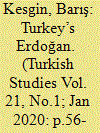

|
|
|
|
|
| Summary/Abstract |
Political leaders appeal to home audiences as well as ‘others’ beyond the state’s borders. Using leadership trait analysis, in the example of Turkey’s Recep Tayyip Erdoğan, this paper questions if and why a leader can exhibit different leadership traits and styles at home and away. The paper is concerned with how Erdoğan's leadership traits and style connect to Turkish foreign policy between March 2003 and May 2013. First, two profiles of Erdoğan are assessed from the interviews he gave to domestic and foreign press. The paper then reports Erdoğan’s profiles by distinguishing between different Western, Eastern, European, American, and Middle Eastern audiences. Based on these profiles, this paper argues that Erdoğan has two different profiles at home and away. Furthermore, it finds that Erdoğan’s profile from his foreign policy interviews with American news outlets stand out from his other profiles. Among other traits, Erdoğan’s task focus changes noticeably among audiences.
|
|
|
|
|
|
|
|
|
|
|
|
|
|
|
|
| 16 |
ID:
116176


|
|
|
|
|
|
|
|